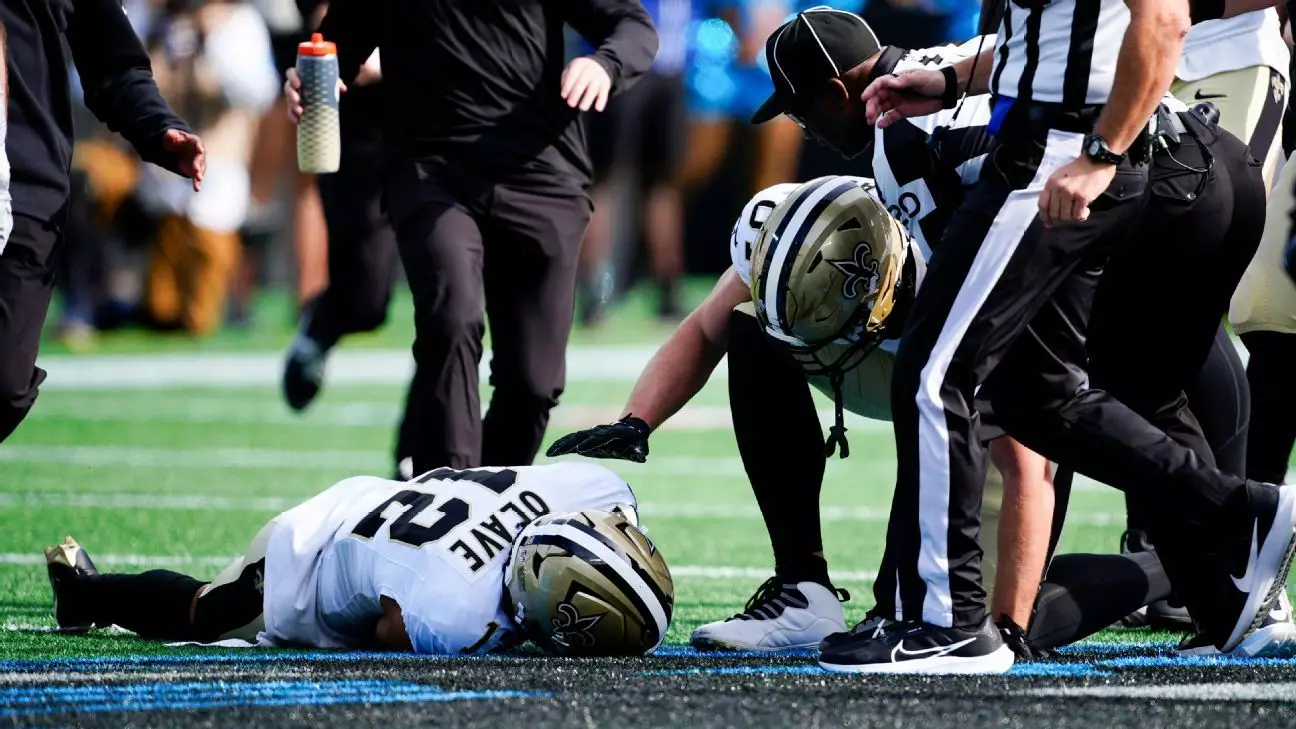The National Football League (NFL) has faced mounting pressure to address the serious issue of player safety, particularly regarding concussions. As more players experience repeated head injuries, the league must grapple with not only the health implications but also the public perception of these incidents. Chris Olave’s recent visit to a local hospital following his second concussion this season serves as a reminder of the precarious nature of a professional athlete’s career. Injuries like this one can have lasting effects on players, not just physically but emotionally and psychologically as well.
In the context of Olave’s injuries, we see a troubling trend. Accumulating concussions can lead to long-term health issues that extend beyond retirement, impacting cognitive function, mood, and overall quality of life. Olave’s case, as well as the experiences of other players, highlights the urgent need for NFL teams to prioritize brain health in their training and medical protocols. The league’s ongoing concussion protocol, while a step in the right direction, needs constant evaluation and improvement to keep pace with the evolving understanding of head injuries.
The aftermath of Olave’s injury did not just stop with his hospitalization; it sparked discussions on social media and in the press. Former Saints wide receiver Michael Thomas took to his X account, indirectly blaming quarterback Derek Carr for Olave’s predicament. His comments not only shed light on team dynamics but also illustrate how quickly narratives can shift in professional sports. At a time when player health is paramount, back-and-forth accusations between teammates can undermine the unity and focus of a team.
Thomas’s tweets highlighted a fraught relationship, suggesting that Carr’s performance has been under scrutiny, especially from former teammates. This raises critical questions about accountability—who is responsible when a player gets injured? Is it the quarterback for delivering a risky pass, or the receiver for not executing the play to perfection? Such discussions often arise in sports media, leading to increased tension within teams and among fans who may take sides publicly.
Following the injury, Carr expressed distress over Olave’s situation, indicating a complex emotional landscape among teammates. Carr mentioned that he feels “a pit in his stomach” whenever a teammate is hurt, conveying the emotional burden athletes carry. When athletes publicly address their feelings about injuries, it can provide insight into the pressures that come with being in high-stakes environments like the NFL.
Moreover, Olave himself reached out on social media to express gratitude for the support he received. This interaction implies a shared experience within the team and a sense of community among players. However, with his brother Josh Olave also weighing in online to support Chris and challenge Thomas’s comments, the incident has also highlighted the importance of family and personal relationships in the professional sports realm, extending the emotional impact of football beyond the field.
Looking forward, the future for Chris Olave seems uncertain. As a young player who has faced multiple concussions early in his career, the Saints will need to seriously consider his health before making decisions that could affect his long-term performance in the league. The organization must implement protective measures, including helmet technology and monitoring practices to minimize the risk of further concussions.
Additionally, Olave’s ability to adapt to these challenges will undoubtedly shape his career trajectory. His reliance on training staff and medical professionals should provide him with the best chance of recovery, but continued support from his peers, coaches, and family will significantly affect his mental fortitude as well. As discussions about player safety continue to evolve, fans will be watching closely to see how the NFL addresses these critical issues.
Chris Olave’s situation encapsulates the multifaceted challenges faced by NFL players today. From the physical dangers associated with concussions to the emotional ramifications of team dynamics, each incident is a thread in the larger tapestry of the NFL. Awareness and communication are essential to ensuring player safety and fostering a supportive team atmosphere. The NFL must prioritize ongoing education, improved safety protocols, and a commitment to player well-being to mitigate the long-term effects of injuries like those experienced by Olave. As the league navigates these tough waters, the focus must remain on protecting the athletes who dedicate their lives to the sport.

Leave a Reply